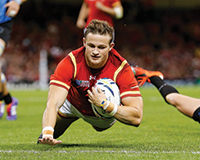
Matthew Shaw and Nicholas Redman consider the tensions between licensees, rugby fans and local residents as the 2015 Rugby World Cup gets into full swing
The Rugby World Cup 2015 is well under way and licensees are naturally expecting, and likely already seeing, an upturn in trade as a result. Many will have planned to capitalise on an increasingly rugby-hungry public (not to mention the estimated 500,000 touring rugby supporters who will visit this country during the tournament) who want to watch the games while enjoying a drink.
Home nation fans naturally want to see their heroes pit themselves against the best in the world and matches are perfectly scheduled for home audiences to watch them in their leisure time. But a repeat of 2014, when the Home Office relaxed licensing laws across the country during the football World Cup in Brazil to allow pubs and bars to open until 1am due to the differing times zones, is unlikely.
The problem is more acute for many visiting teams, particularly those from the southern hemisphere where the time difference will make it difficult for fans at home to follow their team. In New Zealand there is a campaign to persuade employers to adjust the working day so that fans may align themselves with British Summer Time and follow the tournament.
Brewing controversy
All but one of England’s pool A games take place at Twickenham on either a Friday or Saturday evening, which will ensure that local pubs and clubs will be packed with fans wanting to see the game. This will naturally provide a spike in business for the licensed trade. However, it has caused some controversy. Residents who live in the area around Twickenham stadium have complained about the behaviour of fans attending home games, particularly when they are leaving because they have often had the opportunity to drink for long periods. While rugby fans are stereotypically much better behaved than football fans such that significant measures are not required in order to deal with crime and disorder, there are concerns that fans are likely to be loud and will have lost their inhibitions.
Twickenham is hosting 10 out of 48 tournament games, including all but one of England’s group games as well as the quarter-finals, semi-finals, the final and the third place play off. So, a large number of matches are being played at the venue in a relatively short period of time.
On the evening of a recent warm-up game local pubs were asked to restrict entry voluntarily after 10pm in order to reduce the impact on local residents. But licensees were concerned about the loss of trade, contending that Twickenham was looking to promote the stadium’s own bars (allegedly announcements were made in the stadium advising fans that while local pubs were shut, fans could continue to drink in the stadium).
They were also concerned about the authorities’ focus on Twickenham, arguing that the tournament is being played at venues around the country without the same level of scrutiny.
The relevant stakeholders in Twickenham, including from the local licensing authority, the Metropolitan Police, the Rugby Football Union, local publicans and tournament organisers have reviewed the effect of the voluntary closure and agreed a more flexible approach designed to react to the number of people present in key locations and in certain premises. This will ensure that real-time decisions can be made based on up-to-date information to manage people flows, overcrowding and hot spots. The police will stand ready to move people along or ask venues to close early or when full.
Trying to capitalise
Interest in the tournament is likely to grow, especially if any of the home nations progress to the latter stages of the competition. While it may be too late to make significant changes to premises’ licences in order to capitalise on this interest, there are still some steps that licensees can take in order to get the most out of their premises’ licences during the Rugby World Cup.
Here are some suggestions, based in part on the deregulation that has occurred in the licensing regime in recent years. Licensees could:
- Play live or recorded amplified music before 11pm in licensed premises before an audience of up to 500 – any live music conditions that may be included on a licence now do not apply to these type of activities. Why not have a band on hand to really get the party started and to help celebrate if England secure an important victory?
- Play live unamplified music before an audience of any size between 8am and 11pm. Consider hosting a traditional Irish band, a Welsh male voice choir or a bagpiper, depending on the event or the audience.
- Submit a temporary event notice (“TEN”) to allow longer opening hours or activities that are not normally permitted on the premises licence. Licensees may lodge up to 12 TENs in any one year and, subject to certain restrictions being satisfied, there would be time to get two or three in during the tournament. In principle, licensees may seek to extend their hours to take advantage of a big match, host a party in a marquee or other area of the premises not normally covered by their premises licence or even host a special screening of the new documentary Building Jerusalem about England’s successful World Cup 2003 campaign.
It’s all to play for.
Matthew Shaw is a senior associate in the litigation and regulatory group and Nicholas Redman is a senior professional support lawyer in the real estate group at DLA Piper UK LLP







